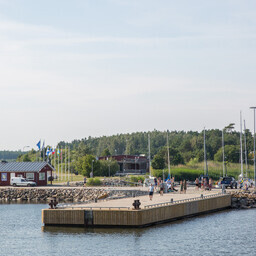Ruhnu on väike saar. Saarel on plaan kasutada ainult
taastuvenergia
t aastaks 2030. Praegu kasutab saar
diiselgeneraator
eid. Diislit tuleb saarele vedada.
taastuvenergia
Tõlge fraasile: taastuvenergia
EN
renewable energy
diiselgeneraator
Tõlge fraasile: diiselgeneraator
EN
diesel generator
Eesti Saarte Enerigaagentuuri juhataja Sulev Alajõe ütleb, et Ruhnu saab diislivabaks. Taastuvenergia kasutamine on võimalik. Ruhnu ja Saaremaa on neli aastat osalenud programmis "
Puhas energia
Euroopa Liidu saartele". Programmi eesmärk on aidata saartel kasutada ainult
taastuvenergia
t aastaks 2030.
Puhas energia
Tõlge fraasile: Puhas energia
EN
Clean energy
taastuvenergia
Tõlge fraasile: taastuvenergia
EN
renewable energy
Alajõe ütleb, et Ruhnu saab kasutada rohkem
tuuleenergia
t. Oluline on ka
akude kasutamine
. Päikeselistel ja tuulistel päevadel saab elektrit salvestaa. Siis saab seda hiljem kasutada, kui tuult ja päikest pole. Diiselgeneraator jääks ainult
varuvõimalus
eks.
tuuleenergia
Tõlge fraasile: tuuleenergia
EN
wind energy
akude kasutamine
Tõlge fraasile: akude kasutamine
EN
use of batteries
varuvõimalus
Tõlge fraasile: varuvõimalus
EN
backup option
Praegu ei saa Ruhnu seda lahendust kasutada. Puudub
piisav võimsus
. Alajõe räägib, et riigiga arutatakse
taastuvenergia
kasutamist. See on
tehnoloogiliselt võimalik
. Keskvalitsus peab selle heaks kiitma. See nõuab investeeringuid, kuid need tasuvad ära.
piisav võimsus
Tõlge fraasile: piisav võimsus
EN
sufficient capacity
taastuvenergia
Tõlge fraasile: taastuvenergia
EN
renewable energy
tehnoloogiliselt võimalik
Tõlge fraasile: tehnoloogiliselt võimalik
EN
technologically possible
Kui plaan töötab, ei pea Ruhnu enam
diislit vedama
. Saar saab olla
sõltumatu diislist
. See oleks hea keskkonnale ja saare elanikele.
diislit vedama
Tõlge fraasile: diislit vedama
EN
transport diesel
sõltumatu diislist
Tõlge fraasile: sõltumatu diislist
EN
independent from diesel
Ruhnu is a small island. The island plans to use only renewable energy by 2030. Currently, the island uses diesel generators. Diesel has to be transported to the island.
The head of the Estonian Islands Energy Agency, Sulev Alajõe, says that Ruhnu can become diesel-free. Using renewable energy is possible. Ruhnu and Saaremaa have participated for four years in the "Clean Energy for EU Islands" program. The goal of the program is to help islands use only renewable energy by 2030.
Alajõe says that Ruhnu can use more wind energy. Battery usage is also important. On sunny and windy days, electricity can be stored. It can then be used later when there is no wind or sun. The diesel generator would remain only as a backup.
Currently, Ruhnu cannot implement this solution. There is insufficient capacity. Alajõe mentions that discussions with the government about using renewable energy are ongoing. It is technologically feasible. The central government must approve it. It requires investments, but they will pay off.
If the plan works, Ruhnu will no longer need to transport diesel. The island can become independent of diesel. This would be good for the environment and the island's residents.

